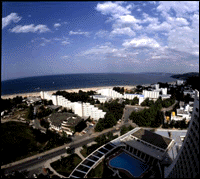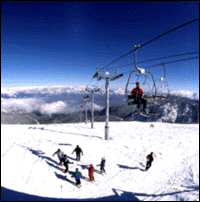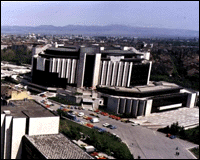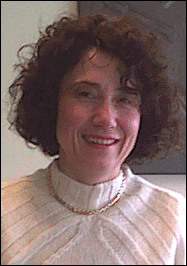 A BUSINESS "AT LEISURE" A BUSINESS "AT LEISURE" |

In 2002 Bulgaria expects some USD 1.3 billion in revenue from the leisure industry, recreation and tourism, which is by 16-17% up on two successive record-highs of USD 1 billion in 2000 and 2001. In 2001, tourism was the No. 1 export branch of Bulgaria's economy.
In 2001 Bulgaria was visited by 5.1 million foreigners, of them 54% came as tourists.
"I love Bulgaria. It is a rich and beautiful country full of life, keeping the fires of an ancient and important part of human history burning", former US president Bill Clinton said in a video address to the participants in an international conference on tourism held in Sofia in January 2002.
Former Nevada Governor Bob Miller called Bulgaria "a country of dreams" due to its unique combination of natural assets and geographic location.


The country sits on the crossroads between two continents. It has a 200 km seashore line, various mountainous landscapes, unique cultural and architectural reservations that house artefacts of one of the most ancient civilizations in the world. Bulgaria offers reasonable prices and high-level expertise, but its development is still constrained by limited financial resources for renovation and development of new tourist services.


Bulgarian tourism however still needs the state support. The perfect sand on the beaches and the deep snow on the ski tracks could hardly be a sufficient excuse for the still underdeveloped road and communications infrastructure. But this is not only bad news as major infrastructure projects are gaining momentum and are on the verge of emerging out of their design stage.

 |
Currently, 96% of all tourist assets are in private hands. According to Deputy Minister of Economy Dimitar Hadjinikolov (link to interview), the efforts of the government are currently dedicated to the development of a comprehensive national policy for development of tourism. Prime Minister Simeon Saxe Coburg-Gotha (link to interview) sees a substantial potential for the development of ecological and rural tourism as well, which would allow Bulgaria to utilize its huge natural potential.

Bulgaria seems to have avoided the general decline of tourism after the September 11, 2001 terrorist attacks on New York and Washington. On the contrary, the general slow-down of world tourism is seen as an opening for Bulgaria to get some of its lost international positions back.
Bulgaria is ranked 27-th among the 60 member states of the International Tourist Organization. By 2020 Bulgaria will be able to attract as many as 10.6 million tourists a year, which is more than its current population, according to forecasts of the World Trade Organization.Since 1992, foreign investors have invested a total of USD 137 million in tourism in Bulgaria, which is a very small portion of the overall foreign investments for the same period. Still, Bulgaria managed to develop and improve the quality of services despite the difficulties of the economic transition.
In a sense, the tourist sector in Bulgaria is unique as - despite expectations - there were no serious foreign investors interested in the privatization of the sector. Local companies made the bulk of all investments.
"Tourism in Bulgaria should not be mixed up with the tourism activity that is taking place in Sofia, because Sofia is not necessarily a tourist attraction", Armin Zerunyan, General Manager of Sofia's newest luxury hotel, the Hilton, said. Bulgaria's tourist facilities are concentrated on the Black Sea coast, and in winter skiing resorts tale over. Sofia does not have much to do with that kind of tourism. Bulgaria's capital, however, is a business destination, and accounts for most of the remaining 46% of foreign visitors.


"This country plans to enter the EU and NATO, and this brings about a great deal of visitors for these matters", Zerunyan added. "There is foreign investment still coming, there is some privatization still going on, so there is business traffic taking place. The Hilton Manager claims his company has brought in a new understanding of quality and service and it is well appreciated. Moreover, Sofia hosts the biggest convention center in the region, the National Palace of Culture. "Business comes when business is there", Zerunyan said.



New projects are just around the corner in the sector.
Hotel
Central's next endeavor is "certain and
secure; we have already bought the place and we
welcome any foreign partner who would be interested
in this venture", Diana
Kostova, Manager of Hotel
Central, located a five minutes walk away from
the actual city center, said. |

